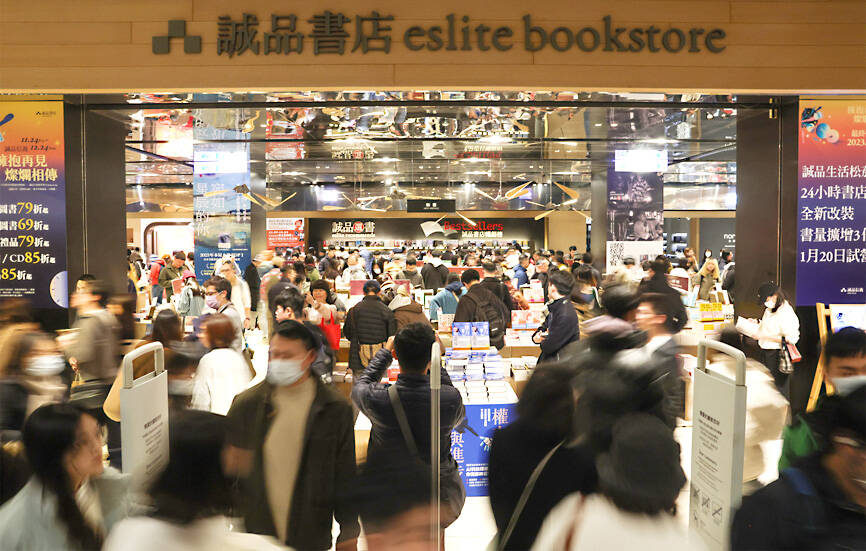The closure of Eslite Spectrum Corp’s (誠品生活) 24-hour bookstore in Taipei’s Xinyi District (信義) after 18 years was “far from the end of an era,” thanks to the generations of readers nurtured by the outlet, company chairwoman Mercy Wu (吳旻潔) said yesterday.
At a news conference at the Xinyi store, Wu said that about 1 million people had visited the world’s largest brick-and-mortar retailer of traditional Chinese books this month.
This included more than 75,000 who visited the store on its penultimate day of operations Saturday, Wu said.

Photo: CNA
The Xinyi store officially closed its doors at 10:30pm yesterday.
Eslite’s Songyan outlet, in the Songshan Cultural and Creative Park in Taipei, would succeed the Xinyi outlet in staying open 24 hours a day from Jan. 20, next year. In the meantime, Wu said the Eslite bookstore on the fifth floor of the Nanxi store in Taipei’s Zhongshan District (中山) would run around the clock to bridge the gap.
Eslite is leaving its Xinyi premises after landlord Uni-President Group — which plans to transform the store into a shopping mall called “Dream Plaza” — declined to renew the bookseller’s lease.
Wu said she came to the Xinyi store every day to see messages left by customers, of which the top keywords were “youth” and “companionship,” drawing a different picture of the store’s customers from that of the Dunnan store, which closed in 2020.
Comparing the two stores, Wu said customers at the Dunnan store were mostly in their 50s — “which made me feel like a little girl” — while many at the Xinyi store were in their 20s and 30s.
“If the Dunnan store offers the public a place to pursue knowledge, I think the Xinyi store provided them with intellectual
Highlighting a message left by a customer expressing hope that “Taiwan will become an island of reading habits,” Wu said she took comfort knowing “such a remark does not come from a senior who holds a magnifying glass to read.”
“This is a big motivation for [Eslite] continuing to run 24-hour bookstores in the future,” she said.

Alain Robert, known as the "French Spider-Man," praised Alex Honnold as exceptionally well-prepared after the US climber completed a free solo ascent of Taipei 101 yesterday. Robert said Honnold's ascent of the 508m-tall skyscraper in just more than one-and-a-half hours without using safety ropes or equipment was a remarkable achievement. "This is my life," he said in an interview conducted in French, adding that he liked the feeling of being "on the edge of danger." The 63-year-old Frenchman climbed Taipei 101 using ropes in December 2004, taking about four hours to reach the top. On a one-to-10 scale of difficulty, Robert said Taipei 101

Taiwanese and US defense groups are collaborating to introduce deployable, semi-autonomous manufacturing systems for drones and components in a boost to the nation’s supply chain resilience. Taiwan’s G-Tech Optroelectronics Corp subsidiary GTOC and the US’ Aerkomm Inc on Friday announced an agreement with fellow US-based Firestorm Lab to adopt the latter’s xCell, a technology featuring 3D printers fitted in 6.1m container units. The systems enable aerial platforms and parts to be produced in high volumes from dispersed nodes capable of rapid redeployment, to minimize the risk of enemy strikes and to meet field requirements, they said. Firestorm chief technology officer Ian Muceus said

MORE FALL: An investigation into one of Xi’s key cronies, part of a broader ‘anti-corruption’ drive, indicates that he might have a deep distrust in the military, an expert said China’s latest military purge underscores systemic risks in its shift from collective leadership to sole rule under Chinese President Xi Jinping (習近平), and could disrupt its chain of command and military capabilities, a national security official said yesterday. If decisionmaking within the Chinese Communist Party has become “irrational” under one-man rule, the Taiwan Strait and the regional situation must be approached with extreme caution, given unforeseen risks, they added. The anonymous official made the remarks as China’s Central Military Commission Vice Chairman Zhang Youxia (張又俠) and Joint Staff Department Chief of Staff Liu Zhenli (劉振立) were reportedly being investigated for suspected “serious

American climber Alex Honnold is to attempt a free climb of Taipei 101 today at 9am, with traffic closures around the skyscraper. To accommodate the climb attempt and filming, the Taipei Department of Transportation said traffic controls would be enforced around the Taipei 101 area. If weather conditions delay the climb, the restrictions would be pushed back to tomorrow. Traffic controls would be in place today from 7am to 11am around the Taipei 101 area, the department said. Songzhi Road would be fully closed in both directions between Songlian Road and Xinyi Road Sec 5, it said, adding that bidirectional traffic controls would